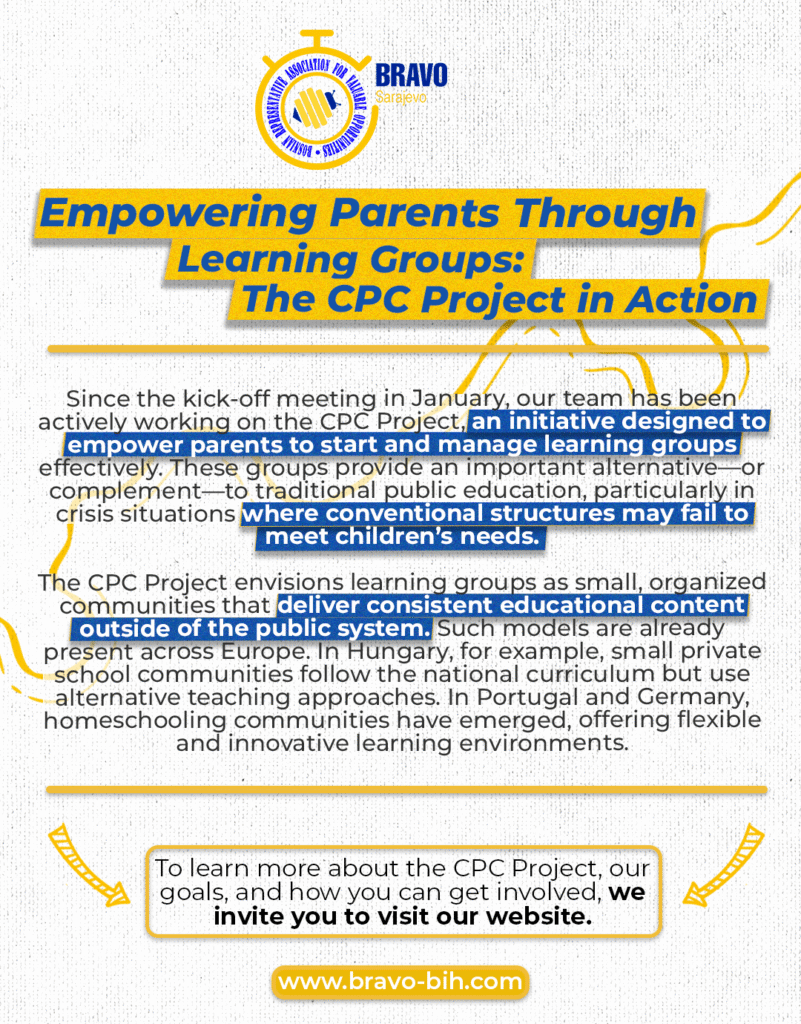
Since the kick-off meeting in January, our team has been actively working on the CPC Project, an initiative designed to empower parents to start and manage learning groups effectively. These groups provide an important alternative—or complement—to traditional public education, particularly in crisis situations where conventional structures may fail to meet children’s needs.
The CPC Project envisions learning groups as small, organized communities that deliver consistent educational content outside of the public system. Such models are already present across Europe. In Hungary, for example, small private school communities follow the national curriculum but use alternative teaching approaches. In Portugal and Germany, homeschooling communities have emerged, offering flexible and innovative learning environments.
The project operates in carefully planned phases. It began with preparation steps such as kick-off events and local knowledge transfer seminars. The initial stage now underway is dedicated to data collection, focusing on existing student groups across partner countries. Each country contributes by researching specific aspects of these communities, ultimately building a collection of best practices.
These insights will be synthesized into a Learning Group Management (LGM) methodology, which will become the backbone of the project. The methodology will culminate in a training manual and facilitator training sessions, offering parents practical guidance. Covering six key themes—from building supportive learning communities to integrating digital tools and ensuring inclusivity for children with special needs—the manual will serve as a comprehensive resource for parents and facilitators alike.
Beyond research and training, the project emphasizes digital presence and community engagement. A dedicated project website and active social media channels will ensure transparency, accessibility, and broad dissemination of results.
The next phase will bring the methodology into practice through fieldwork, including both local and international training sessions. Trained facilitators will then directly support parents, equipping them with the skills to run sustainable learning groups.
Ultimately, the CPC Project goes beyond addressing immediate educational needs. By empowering parents with tools, knowledge, and confidence, it promotes sustainable, adaptable alternatives that can withstand crises and disruptions. The emphasis on blended learning methods, inclusive practices, and supportive communities highlights the project’s holistic vision for education.
Aligned with the EU’s broader educational objectives, the CPC Project represents a practical response to global challenges—from climate change to societal shifts—that increasingly demand flexible and resilient educational systems.
In essence, the CPC Project is not just about learning groups. It is about building communities of resilience, ensuring that children can thrive in any circumstance, and positioning parents as leaders in shaping the future of education.
MORE ABOUT THE PROJECT
The CPC project is designed to empower parents to start and manage learning groups effectively, providing an alternative or supplement to traditional public education. It’s particularly relevant in crisis situations where conventional educational structures may falter. The project envisions learning groups as small, organized communities that deliver regular educational content outside the public system. Examples include small private school communities in Hungary that follow the national curriculum but employ alternative teaching methods. Similar home-schooling communities exist in Portugal and Germany.
The project’s operations span several phases, beginning with preparations like kick-off events and local knowledge transfer seminars. The initial stages focus on data collection through research on existing student groups across various countries. Each partner country is tasked with examining specific aspects of these groups to create a collection of best practices.
These practices will then be synthesized into a comprehensive Learning Group Management (LGM) methodology. The final output will be a training manual alongside facilitator training sessions. The methodology will cover six key themes ranging from building a learning community to integrating digital tools and supporting children with special needs.
The project also involves creating a robust digital presence, including a project website and social media engagement to foster a wider community interaction and dissemination of project results. Fieldwork will follow, with local and international training sessions for facilitators who will then train parents directly. The aim is to make these learning groups viable and sustainable options for parents looking to supplement their children’s education or provide a solid alternative during disruptive times.
Ultimately, the project not only addresses the educational needs of children but also equips parents with the necessary tools and knowledge to lead these initiatives effectively. The focus on a supportive learning environment, blended learning methods, and inclusive education practices underscores the project’s commitment to a holistic educational approach. This initiative is aligned with the EU’s educational objectives and offers a practical response to the growing need for adaptable educational formats in light of global challenges like climate change and societal disruptions.
